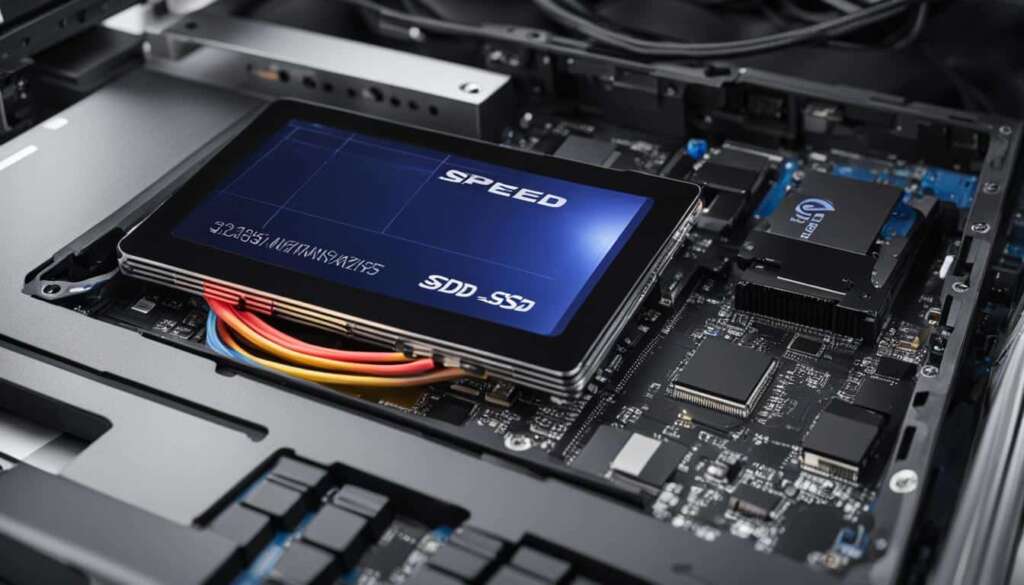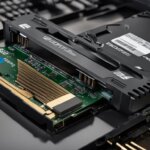Table of Contents
SSDs or Solid State Drives are used in a wide range of computing devices, from laptops and desktops to servers and gaming consoles. But what is SSD used for? In this section, we’ll explore the primary uses of SSDs with a focus on their speed and efficiency benefits.
Key Takeaways
- SSDs offer faster data access and retrieval than traditional hard drives.
- Both personal and business users can benefit from enhanced system performance and speed thanks to SSDs.
- Improved workflow efficiency and simplified multitasking are key benefits of using SSDs.
- SSDs lack moving parts, making them less prone to mechanical failures and physical damage.
- Investing in an SSD can greatly improve your computing experience.
Boosting System Performance and Speed
SSDs are widely used to enhance system performance and speed. Unlike traditional hard drives, SSDs use flash memory technology, which allows for faster data access and retrieval.
With an SSD, you can experience quicker boot-up times, faster file transfers, and reduced loading times for software and applications. This makes SSDs ideal for gaming, multimedia editing, and other demanding tasks that require high-speed data processing.
Moreover, SSDs are capable of handling multiple processes simultaneously. As a result, you can run multiple applications and intensive software programs without experiencing lag or performance issues.
The enhanced speed and improved performance offered by SSDs make them a popular choice for professionals and individuals looking to boost their computing speed and performance, whether for work or personal use.
Improving Workflow Efficiency
SSDs are an excellent tool for enhancing workflow efficiency in a wide range of applications. The faster read and write speeds of SSDs can significantly reduce the time required for data-intensive tasks, allowing for quicker file transfers, software loading times, and overall system responsiveness. This boost in speed and efficiency can increase productivity and improve work efficiency for professionals in various fields such as graphic design, video editing, and software development.
With traditional hard drives, multitasking across multiple applications and working with large files can lead to system lag and delays. However, with an SSD, you can run multiple applications simultaneously without experiencing a significant performance drop. This enables you to work more efficiently, taking full advantage of the system’s power and speed.
Investing in an SSD can be especially beneficial for creatives who work with high-density graphics and video files. With an SSD, the time spent waiting for data to load and transfer is greatly reduced. This helps to eliminate delays and bottlenecks, allowing you to complete work on time and with greater accuracy.
Overall, SSDs provide a major boost to work efficiency, allowing professionals to streamline their workflow and complete projects faster and more accurately. By reducing unnecessary delays and improving system responsiveness, SSDs can enhance productivity and significantly improve your workflow efficiency.
Enhancing System Reliability and Durability
SSDs offer enhanced system reliability and durability compared to traditional hard drives. This is because SSDs lack moving parts, making them less prone to mechanical failures and physical damage. As a result, they are a more reliable storage solution and less likely to experience data loss due to unexpected shocks or vibrations.
Moreover, SSDs have a longer lifespan than traditional hard drives, allowing you to use your system for a longer period without worrying about frequent disk failures. This increased reliability and durability of SSDs make them a popular choice for both personal and business use.
With SSDs, you can experience greater system stability and reduced risk of data loss, thereby enhancing your system’s reliability. Additionally, SSDs can withstand harsh conditions, making them ideal for use in environments where traditional hard drives may fail. This further enhances their durability and longevity, allowing you to use them for extended periods without needing frequent replacements.
By replacing your traditional hard drive with an SSD, you can experience the benefits of enhanced system reliability and durability, along with faster data access and reduced loading times.
Conclusion
In conclusion, SSDs have a wide range of uses and benefits. They not only boost system performance and speed but also improve workflow efficiency and enhance system reliability.
Whether you’re a gamer, a creative professional, or simply looking to enhance your computer’s performance, investing in an SSD can greatly improve your computing experience.
With their speed, efficiency, and durability, SSDs have become an integral part of modern computing. So don’t hesitate to upgrade your computer with an SSD today to take advantage of all the benefits it has to offer.
FAQ
What are the primary uses of SSD?
SSDs are primarily used to enhance system performance and speed, improve workflow efficiency, and enhance system reliability and durability.
How does an SSD boost system performance and speed?
Unlike traditional hard drives, SSDs use flash memory technology, which allows for faster data access and retrieval. This results in quicker boot-up times, faster file transfers, and reduced loading times for software and applications.
How does an SSD improve workflow efficiency?
With their faster read and write speeds, SSDs can significantly reduce the time required for data-intensive tasks. They are beneficial for professionals in fields such as graphic design, video editing, and software development by streamlining workflow and increasing productivity.
How does an SSD enhance system reliability and durability?
SSDs lack moving parts, making them less prone to mechanical failures and physical damage. They are more reliable and less likely to experience data loss due to unexpected shocks or vibrations. Additionally, SSDs have a longer lifespan, resulting in fewer disk failures and increased durability.
Why should I invest in an SSD?
Investing in an SSD can greatly improve your computing experience. They offer speed, efficiency, and durability, making them ideal for various applications such as gaming, multimedia editing, and professional work.












